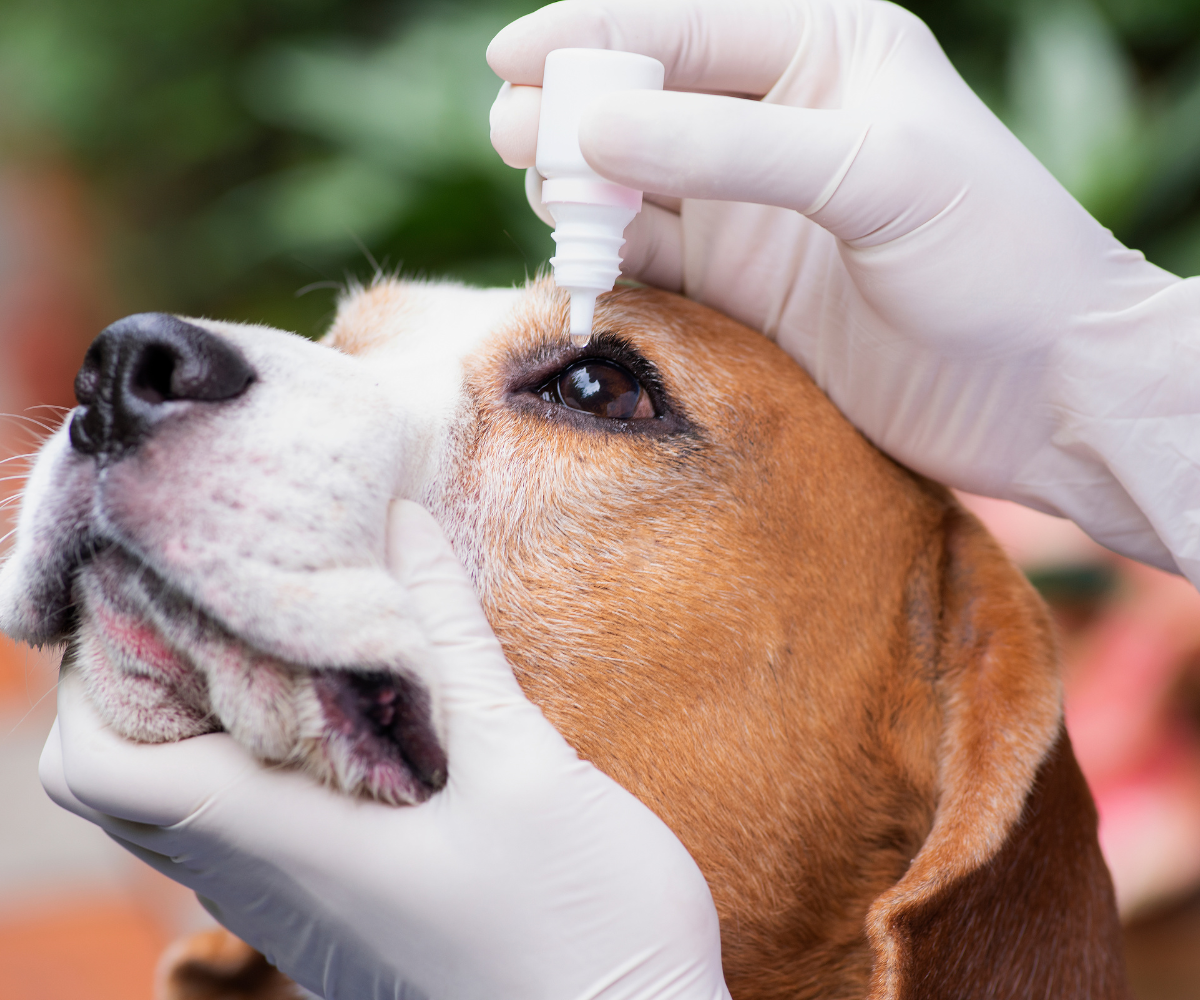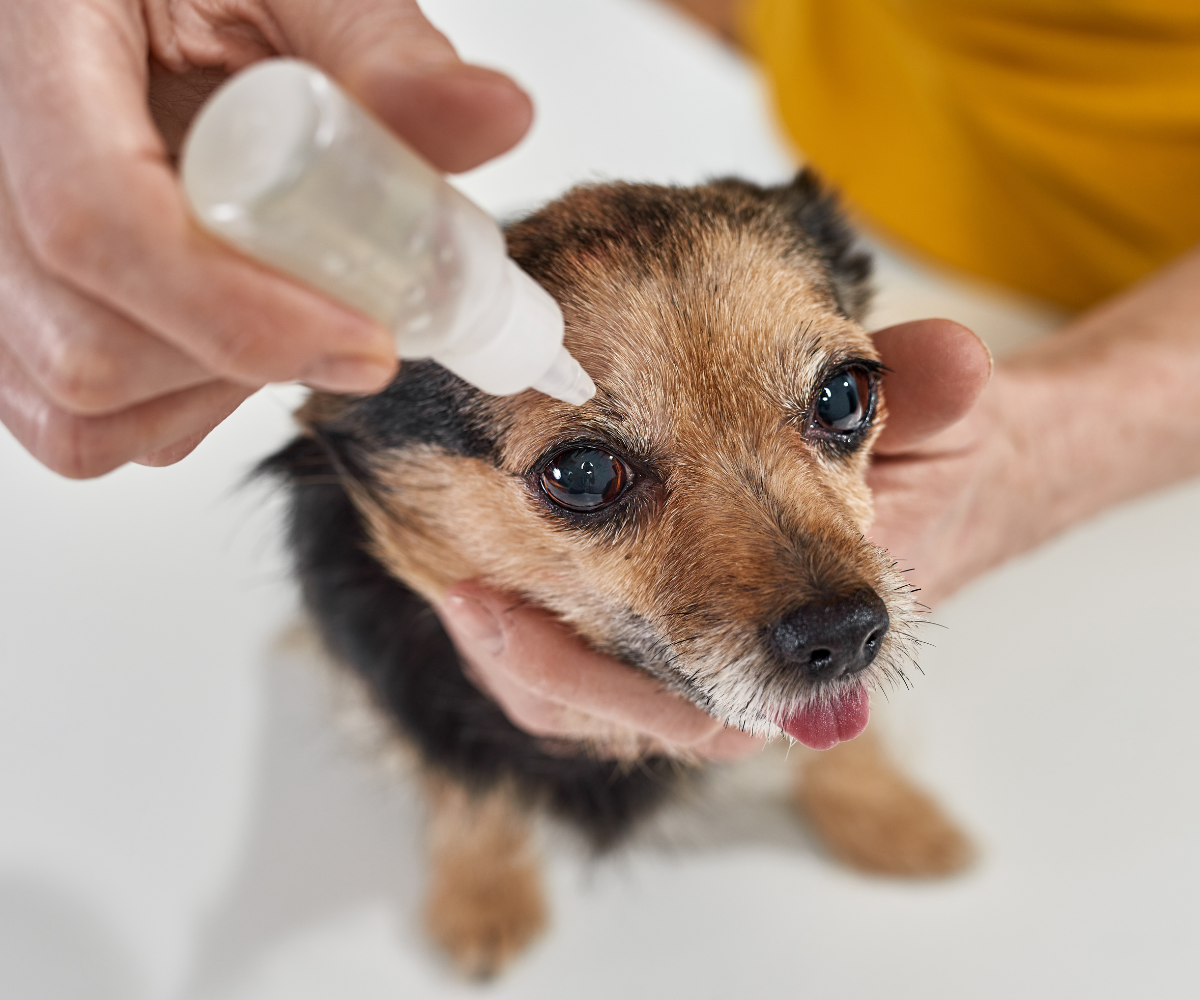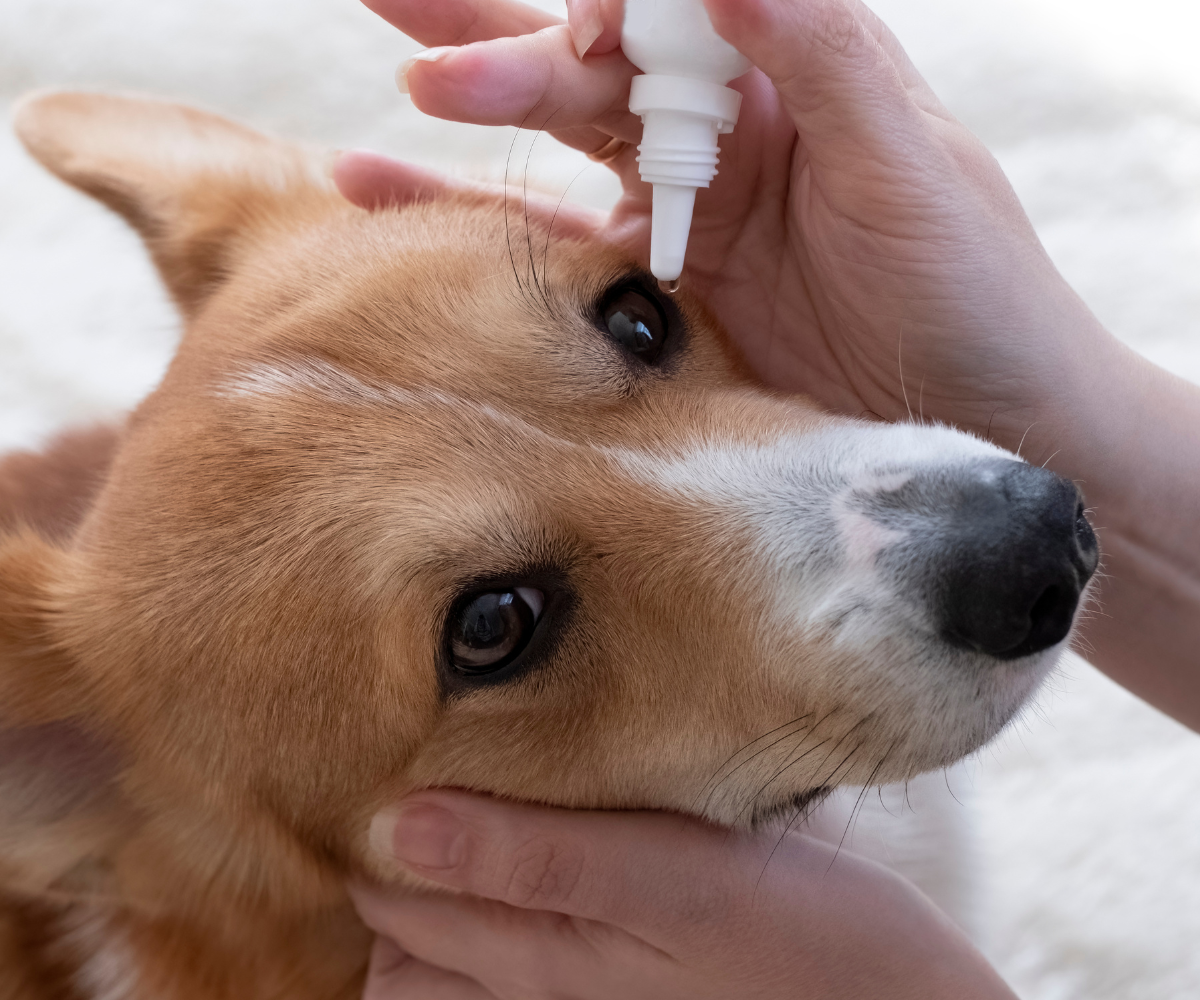Human Eye Drops for Dogs? The Truth (and 2 Safer Options)
Human Eye Drops for Dogs? The Truth (and 2 Safer Options)

Vet Reviewed

By: Sarah Hodgson
March 11, 2024
Table of Contents
Dogs can sometimes develop eye problems like dryness, irritation, or infections. You might wonder: Can human eye drops help my dog? While it may seem like a quick fix, using human over-the-counter (OTC) eye drops on dogs can be risky.
Quick Answer
Some lubricating human eye drops may be safe in rare cases, but most human OTC eye drops contain ingredients that can harm your dog’s sensitive eyes. Always consult a veterinarian before administering any eye medication. Ingredients like naphazoline, artificial dyes, or corticosteroids can cause irritation, corneal ulcers, or even long-term damage.
Why Human Eye Drops Aren’t Always Safe for Dogs
1. Different Formulations
Human eye drops are formulated for human eyes — not canine eyes. Concentrations and active ingredients vary, and some common human components may be toxic to dogs.
2. FDA Approval
OTC human eye drops are FDA-approved for humans only. This means their safety and effectiveness in dogs have not been tested. Using them without professional guidance can lead to unexpected complications.
3. Potential Risks
- Irritation or burning
- Worsened eye conditions
- Corneal ulcers or scratches
- Glaucoma or long-term vision damage
When Human Eye Drops Might Be Safe
Ingredients and Formulations
Human eye drops and dog eye drops may contain different active ingredients, concentrations, and formulations. For example, naphazoline, found in many human eye drops and not safe for dogs, may have adverse side effects if used on a pet. Additionally, human antihistamine and antibiotic eye ointments may not be suitable for dogs, as their doses and ingredients may not be tailored to their needs.
FDA-Approval
Human eye drops are FDA-approved for human use only, not for animals. This means that the safety and effectiveness of these products have not been tested or established for dogs. Giving a pet an untested product can lead to unforeseen problems or complications.
Potential Risks and Side Effects
There are potential risks and side effects when using human eye drops on dogs, including irritation or worsening of the eye condition. Corticosteroids, often found in human eye drops, can be harmful if used improperly in dogs and can lead to complications such as corneal ulcers or even glaucoma.

Which Human Eye Drops Are Safe for Dogs?
When it comes to using human eye drops on dogs, it's crucial to be cautious and consult with your veterinarian before administering any medication. Some human eye drops might be suitable for dogs, while others could be harmful. Here are a few guidelines to help you understand which human eye drops could be safe for your dog:
- Ozone-based eye drops: These eye drops have been studied and shown to be an effective treatment for conditions like conjunctivitis, keratoconjunctivitis, and corneal ulcers in humans and dogs. One example is Ozodrop®. Keep in mind that it's still essential for a vet to conduct a test to determine the source of the infection before using this treatment.
- Lubricating eye drops: Products like Viscotears, which are designed to treat dry eyes in humans, can also be utilized safely for dogs experiencing dry eye symptoms. However, it's important to note that these types of eye drops won't treat eye infections or be suitable for dogs with injured eyes.
While these are a couple of examples of potentially safe human eye drops for dogs, it's crucial to avoid using human over-the-counter (OTC) eye drops without consulting a veterinarian first. Human OTC eye drops have not been tested for animal use and are only approved by the FDA for human use.
Before treating your dog's eye issues with any human eye drops, always consult with a veterinarian. They can provide guidance on the appropriate eye drops to use and ensure your dog receives the correct treatment for their condition.
Common Eye Problems in Dogs & The Appropriate Treatment
Dry Eye
- Symptoms: Redness, irritation, watery or sticky eyes.
- Treatment: Vet-approved lubricating eye drops or artificial tears.
Pink Eye (Conjunctivitis)
- Symptoms: Redness, discharge, swelling.
- Treatment: Vet-prescribed antibiotic or ozone-based drops, depending on cause.
Glaucoma & Corneal Ulcers
- Serious conditions requiring immediate veterinary care.
- Do not use OTC human drops — can worsen damage.
Allergies or Minor Irritation
- Vet may recommend antihistamine drops or steroid drops if necessary.

When to See a Veterinarian
Consult a vet immediately if your dog shows:
- Redness, swelling, or discharge
- Squinting or rubbing the eyes
- Signs of pain
- Corneal ulcers or trauma
- Excessive tearing or staining
Early intervention can prevent serious complications and preserve your dog’s vision.
The Bottom Line
Human OTC eye drops are generally not recommended for dogs. Some lubricating or ozone-based drops may be safe, but only under veterinary supervision. Always consult your vet before giving your dog any human medication. Prioritize your dog’s eye health and use vet-approved treatments to avoid long-term damage.
Frequently Asked Questions
Can I use Visine on my dog?
No. Visine contains naphazoline, which can be toxic to dogs and may cause serious eye problems. Always use vet-approved drops instead.
What if my dog’s eye is red but not painful?
Red eyes may still indicate infection or irritation. Have a veterinarian examine your dog before using any human drops.
Can lubricating drops like artificial tears be used safely?
In some cases, yes — but only with veterinary guidance. These drops may relieve mild dry eyes, but they do not treat infections or injuries.
Are there any human eye drops completely safe for dogs?
Ozone-based eye drops (e.g., Ozodrop®) have shown promise, but must still be used under veterinary supervision. There’s no OTC human drop universally safe for all dogs.

Subscribe to Petfluence!
Get updates on the latest posts and more from Petfluence straight to your inbox.